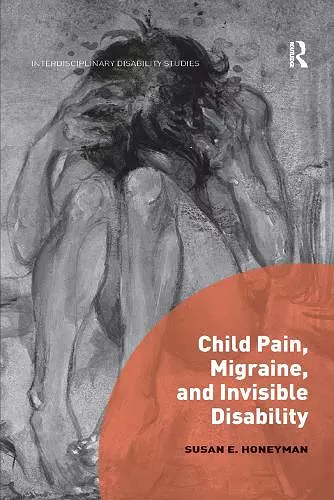Child Pain, Migraine, and Invisible Disability
Format:Paperback
Publisher:Taylor & Francis Ltd
Published:15th Apr '19
Currently unavailable, and unfortunately no date known when it will be back
This paperback is available in another edition too:
- Hardback£155.00(9781138207868)

In the twenty-first century there is increasing global recognition of pain relief as a basic human right. However, as Susan Honeyman argues in this new take on child pain and invisible disability, such a belief has historically been driven by adult, ideological needs, whereas the needs of children in pain have traditionally been marginalised or overlooked in comparison.
Examining migraines in children and the socially disabling effects that chronic pain can have, this book uses medical, political and cultural discourse to convey a sense of invisible disability in children with migraine and its subsequent oppression within educational and medical policy. The book is supported by authentic migraineurs’ experiences and first-hand interviews as well as testimonials from a range of historical, literary, and medical sources never combined in a child-centred context before. Representations of child pain and lifespan migraine within literature, art and popular culture are also pulled together in order to provide an interdisciplinary guide to those wanting to understand migraine in children and the identity politics of disability more fully.
Child Pain, Migraine, and Invisible Disability will appeal to scholars in childhood studies, children’s rights, literary and visual culture, disability studies and medical humanities. It will also be of interest to anyone who has suffered from migraines or has cared for children affected by chronic pain.
'The Western contemporary ethos confers innocence and nostalgia on childhood, a tendency that too often belittles, denies or oversimplifies the suffering that real children experience. Young sufferers from migraine are consummate examples of this dilemma, as Susan Honeyman documents well in Child Pain, Migraine and Invisible Disability. Health care providers, who generally ask children to report pain using a reductionist single answer on a pain scale, would do well to consider Honeyman’s complex, humane account (including first-person narratives).'—Cindy Dell Clark, Rutgers University, U.S.A
'The Western contemporary ethos confers innocence and nostalgia on childhood, a tendency that too often belittles, denies or oversimplifies the suffering that real children experience. Young sufferers from migraine are consummate examples of this dilemma, as Susan Honeyman documents well in Child Pain, Migraine and Invisible Disability. Health care providers, who generally ask children to report pain using a reductionist single answer on a pain scale, would do well to consider Honeyman’s complex, humane account (including first-person narratives).'—Cindy Dell Clark, Rutgers University, U.S.A
"I cannot write a dispassionate review of this book. I read sections of this book aloud to my partner, who was my companion through twelve years of migraine. I wept in recognition and fulminated on behalf of my fellow migraineurs. I became intensely angry on behalf of today’s child migraineurs for whom not only many things not have become better, but for whom modern ideologies of education have created an increasingly hostile environment. This book needs to be in paperback and Kindle, and a copy needs to be handed to every medical student and teacher." --Farah Mendlesohn, The Lion and the Unicorn
ISBN: 9780367208196
Dimensions: unknown
Weight: 453g
208 pages